HI6006 - Competitive Strategy: Age Care vs. Pharmaceutical Industries
VerifiedAdded on 2024/07/29
|9
|1655
|401
Essay
AI Summary
This essay explores the competitive strategies employed within the Australian age care and pharmaceutical industries, focusing on Shalom Aged Care Centre and Amgen Australia Pty Ltd, respectively. It utilizes frameworks such as the Ansoff Matrix and Porter's Five Forces model to analyze the competitive landscape of the age care sector, examining market penetration, development, product development, diversification, and rivalry. For the pharmaceutical industry, the essay employs SWOT and PESTLE analyses to assess internal strengths and weaknesses, as well as external political, economic, social, technological, legal, and environmental factors influencing Amgen's competitive positioning. The analysis highlights the importance of these strategic tools in understanding and navigating the competitive dynamics of these industries, emphasizing the need for companies to adapt and innovate to maintain a competitive edge.
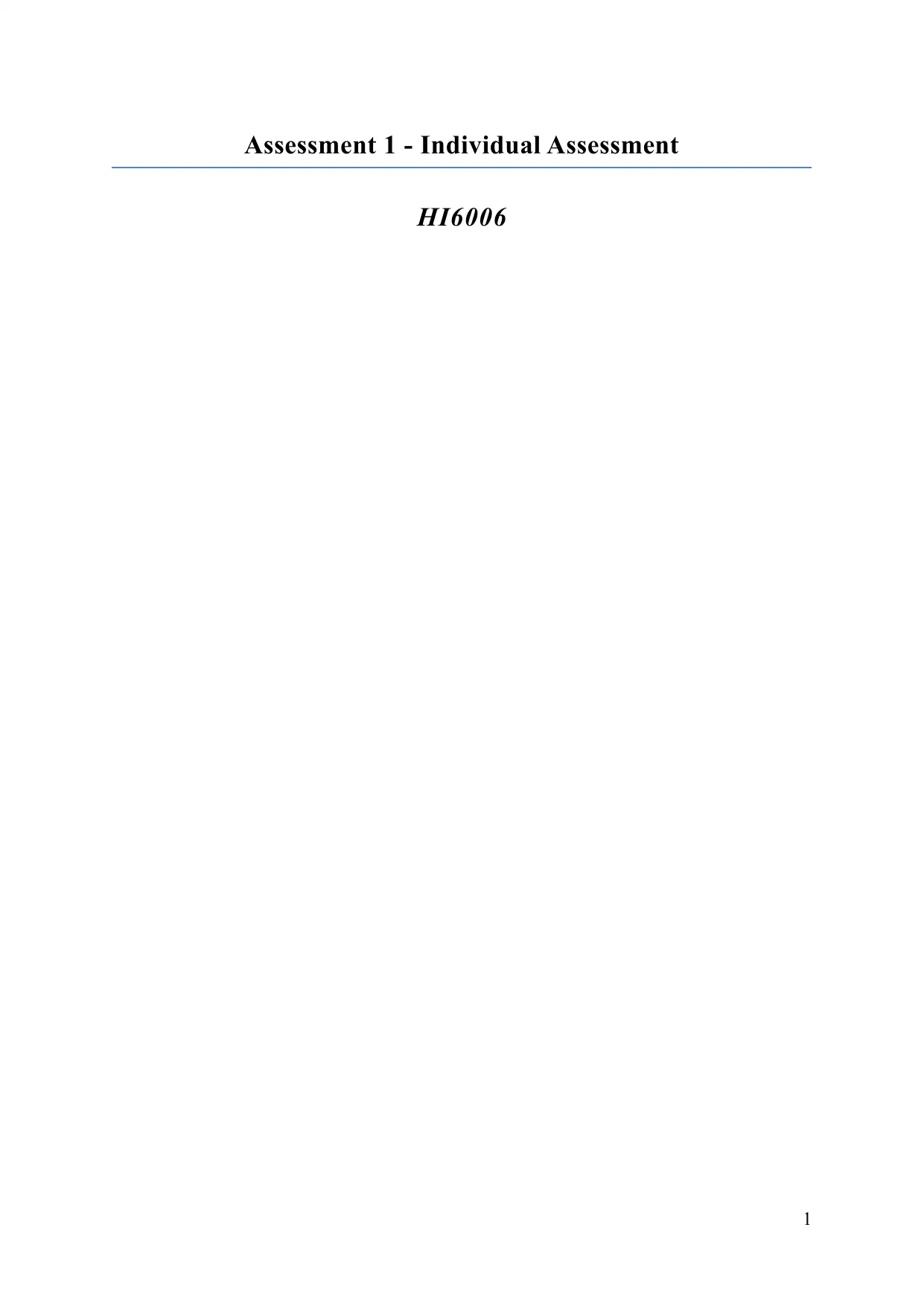
Assessment 1 - Individual Assessment
HI6006
1
HI6006
1
Paraphrase This Document
Need a fresh take? Get an instant paraphrase of this document with our AI Paraphraser
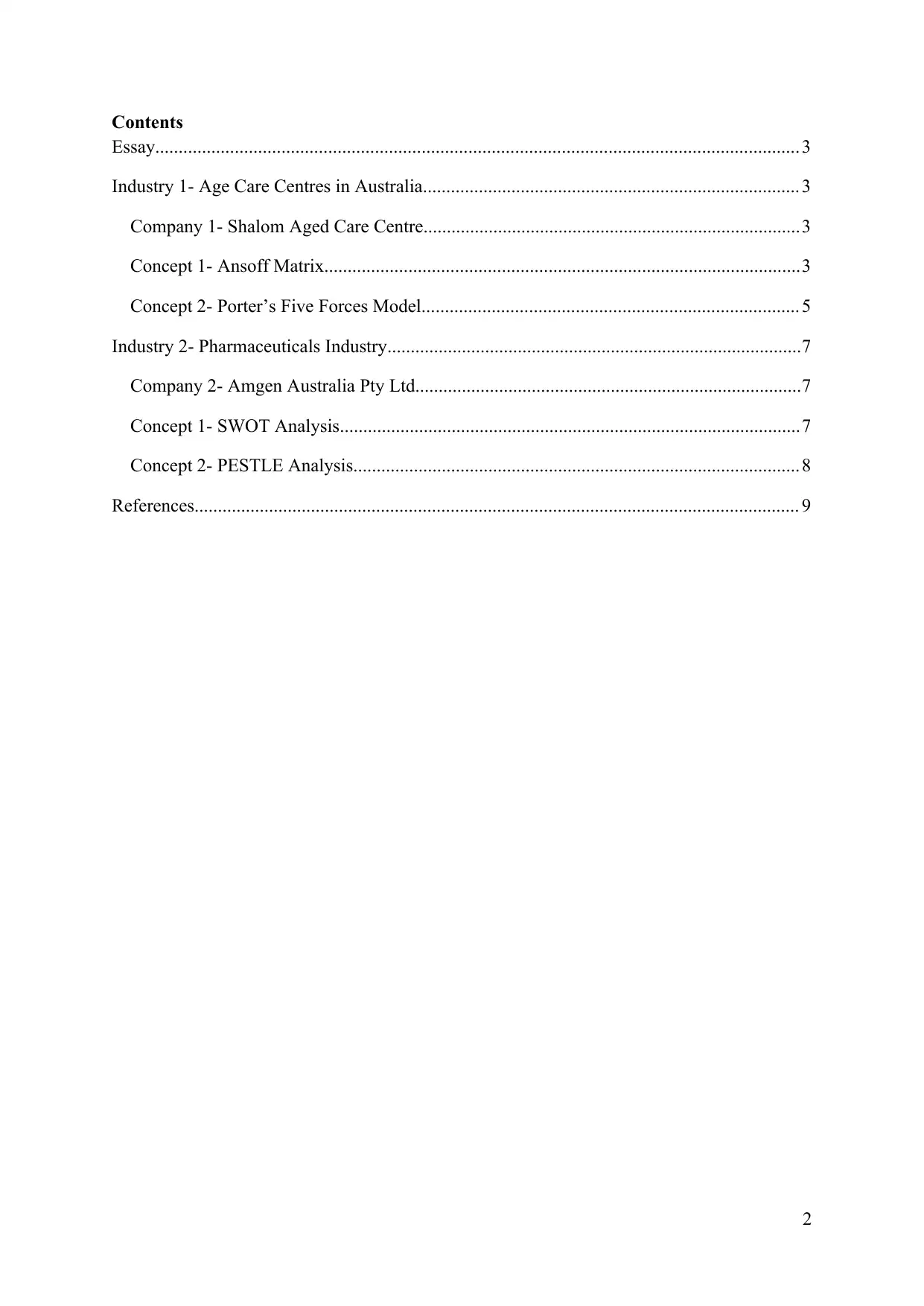
Contents
Essay.......................................................................................................................................... 3
Industry 1- Age Care Centres in Australia................................................................................. 3
Company 1- Shalom Aged Care Centre.................................................................................3
Concept 1- Ansoff Matrix......................................................................................................3
Concept 2- Porter’s Five Forces Model................................................................................. 5
Industry 2- Pharmaceuticals Industry.........................................................................................7
Company 2- Amgen Australia Pty Ltd...................................................................................7
Concept 1- SWOT Analysis...................................................................................................7
Concept 2- PESTLE Analysis................................................................................................ 8
References.................................................................................................................................. 9
2
Essay.......................................................................................................................................... 3
Industry 1- Age Care Centres in Australia................................................................................. 3
Company 1- Shalom Aged Care Centre.................................................................................3
Concept 1- Ansoff Matrix......................................................................................................3
Concept 2- Porter’s Five Forces Model................................................................................. 5
Industry 2- Pharmaceuticals Industry.........................................................................................7
Company 2- Amgen Australia Pty Ltd...................................................................................7
Concept 1- SWOT Analysis...................................................................................................7
Concept 2- PESTLE Analysis................................................................................................ 8
References.................................................................................................................................. 9
2
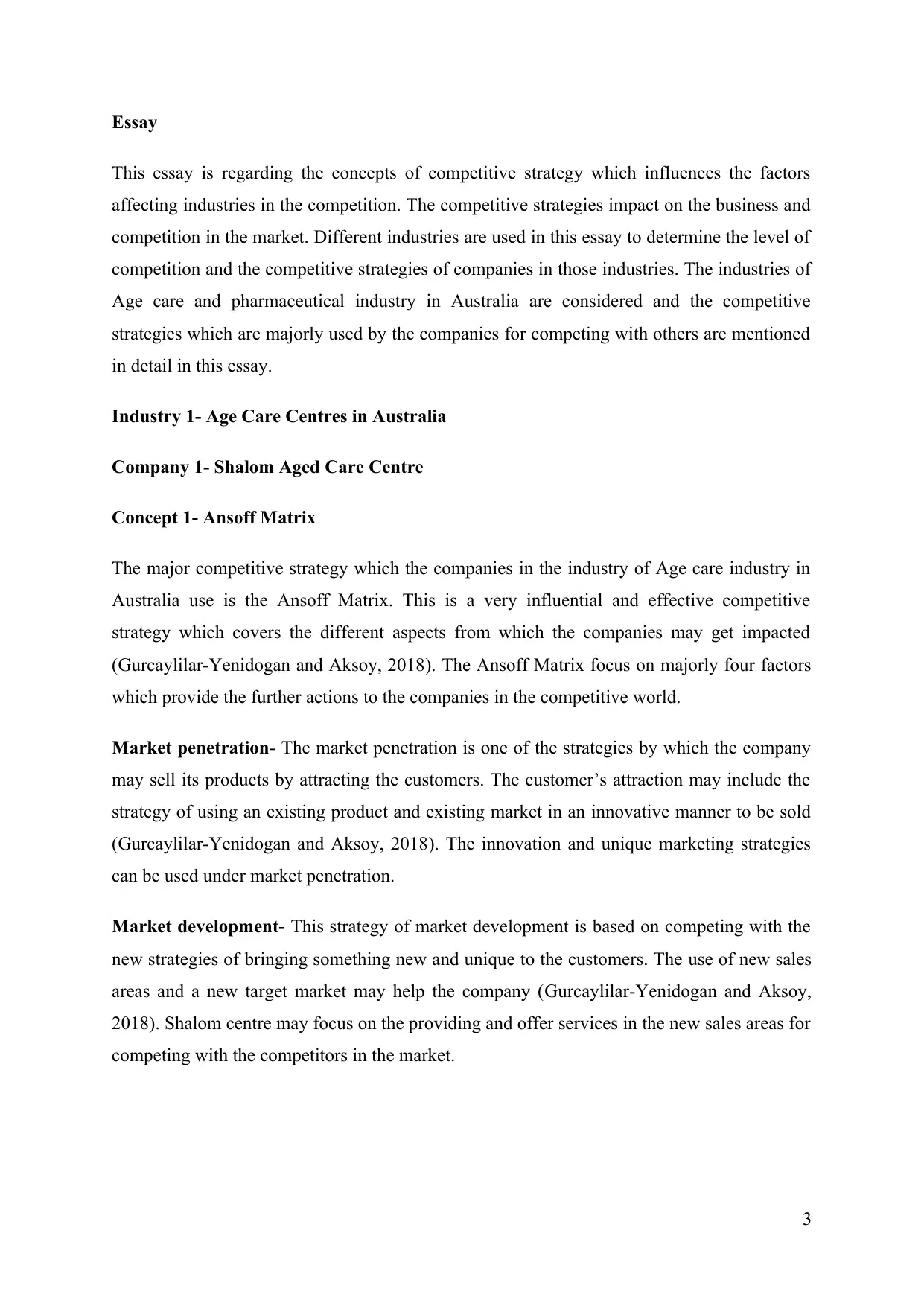
Essay
This essay is regarding the concepts of competitive strategy which influences the factors
affecting industries in the competition. The competitive strategies impact on the business and
competition in the market. Different industries are used in this essay to determine the level of
competition and the competitive strategies of companies in those industries. The industries of
Age care and pharmaceutical industry in Australia are considered and the competitive
strategies which are majorly used by the companies for competing with others are mentioned
in detail in this essay.
Industry 1- Age Care Centres in Australia
Company 1- Shalom Aged Care Centre
Concept 1- Ansoff Matrix
The major competitive strategy which the companies in the industry of Age care industry in
Australia use is the Ansoff Matrix. This is a very influential and effective competitive
strategy which covers the different aspects from which the companies may get impacted
(Gurcaylilar-Yenidogan and Aksoy, 2018). The Ansoff Matrix focus on majorly four factors
which provide the further actions to the companies in the competitive world.
Market penetration- The market penetration is one of the strategies by which the company
may sell its products by attracting the customers. The customer’s attraction may include the
strategy of using an existing product and existing market in an innovative manner to be sold
(Gurcaylilar-Yenidogan and Aksoy, 2018). The innovation and unique marketing strategies
can be used under market penetration.
Market development- This strategy of market development is based on competing with the
new strategies of bringing something new and unique to the customers. The use of new sales
areas and a new target market may help the company (Gurcaylilar-Yenidogan and Aksoy,
2018). Shalom centre may focus on the providing and offer services in the new sales areas for
competing with the competitors in the market.
3
This essay is regarding the concepts of competitive strategy which influences the factors
affecting industries in the competition. The competitive strategies impact on the business and
competition in the market. Different industries are used in this essay to determine the level of
competition and the competitive strategies of companies in those industries. The industries of
Age care and pharmaceutical industry in Australia are considered and the competitive
strategies which are majorly used by the companies for competing with others are mentioned
in detail in this essay.
Industry 1- Age Care Centres in Australia
Company 1- Shalom Aged Care Centre
Concept 1- Ansoff Matrix
The major competitive strategy which the companies in the industry of Age care industry in
Australia use is the Ansoff Matrix. This is a very influential and effective competitive
strategy which covers the different aspects from which the companies may get impacted
(Gurcaylilar-Yenidogan and Aksoy, 2018). The Ansoff Matrix focus on majorly four factors
which provide the further actions to the companies in the competitive world.
Market penetration- The market penetration is one of the strategies by which the company
may sell its products by attracting the customers. The customer’s attraction may include the
strategy of using an existing product and existing market in an innovative manner to be sold
(Gurcaylilar-Yenidogan and Aksoy, 2018). The innovation and unique marketing strategies
can be used under market penetration.
Market development- This strategy of market development is based on competing with the
new strategies of bringing something new and unique to the customers. The use of new sales
areas and a new target market may help the company (Gurcaylilar-Yenidogan and Aksoy,
2018). Shalom centre may focus on the providing and offer services in the new sales areas for
competing with the competitors in the market.
3
⊘ This is a preview!⊘
Do you want full access?
Subscribe today to unlock all pages.

Trusted by 1+ million students worldwide
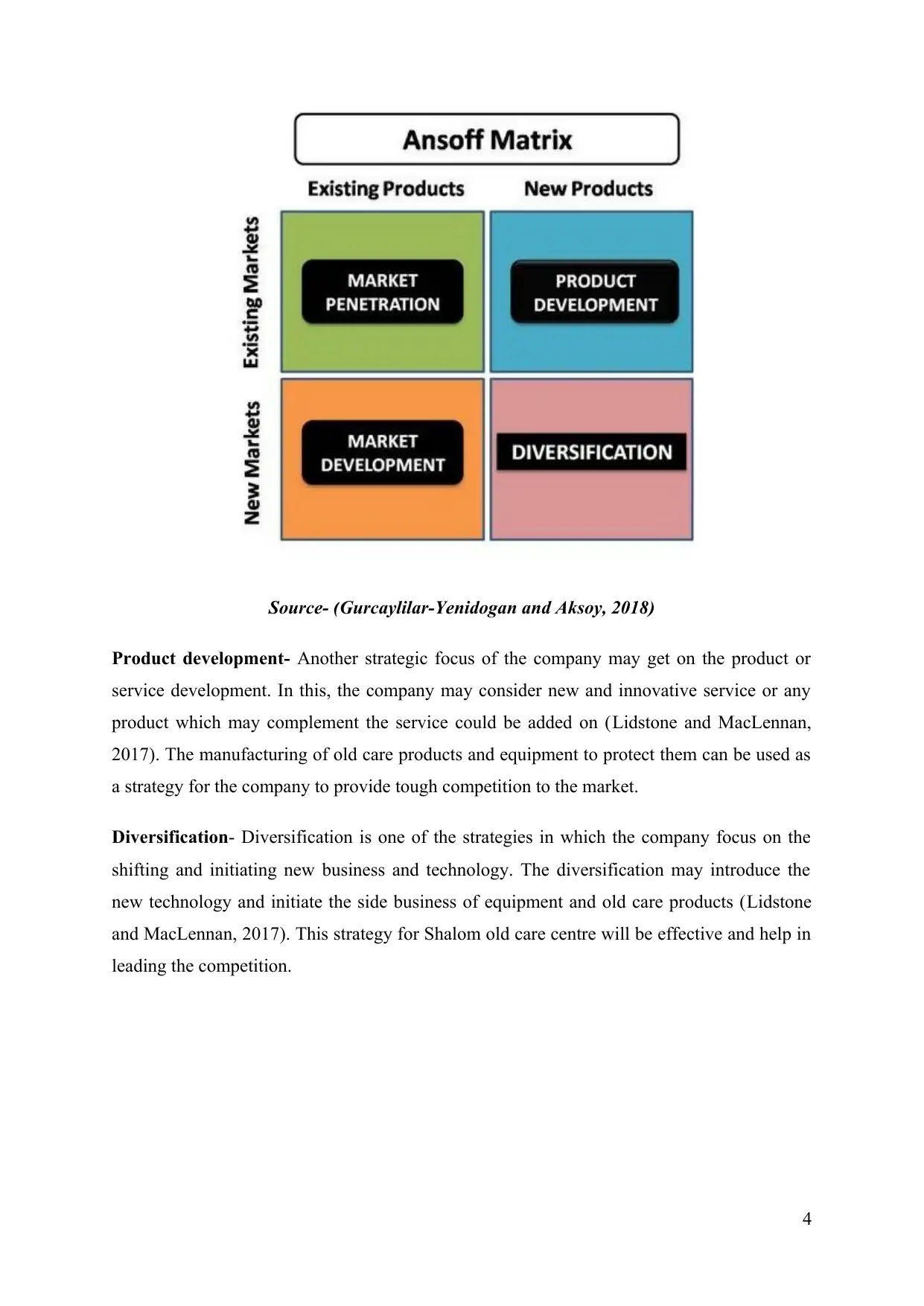
Source- (Gurcaylilar-Yenidogan and Aksoy, 2018)
Product development- Another strategic focus of the company may get on the product or
service development. In this, the company may consider new and innovative service or any
product which may complement the service could be added on (Lidstone and MacLennan,
2017). The manufacturing of old care products and equipment to protect them can be used as
a strategy for the company to provide tough competition to the market.
Diversification- Diversification is one of the strategies in which the company focus on the
shifting and initiating new business and technology. The diversification may introduce the
new technology and initiate the side business of equipment and old care products (Lidstone
and MacLennan, 2017). This strategy for Shalom old care centre will be effective and help in
leading the competition.
4
Product development- Another strategic focus of the company may get on the product or
service development. In this, the company may consider new and innovative service or any
product which may complement the service could be added on (Lidstone and MacLennan,
2017). The manufacturing of old care products and equipment to protect them can be used as
a strategy for the company to provide tough competition to the market.
Diversification- Diversification is one of the strategies in which the company focus on the
shifting and initiating new business and technology. The diversification may introduce the
new technology and initiate the side business of equipment and old care products (Lidstone
and MacLennan, 2017). This strategy for Shalom old care centre will be effective and help in
leading the competition.
4
Paraphrase This Document
Need a fresh take? Get an instant paraphrase of this document with our AI Paraphraser
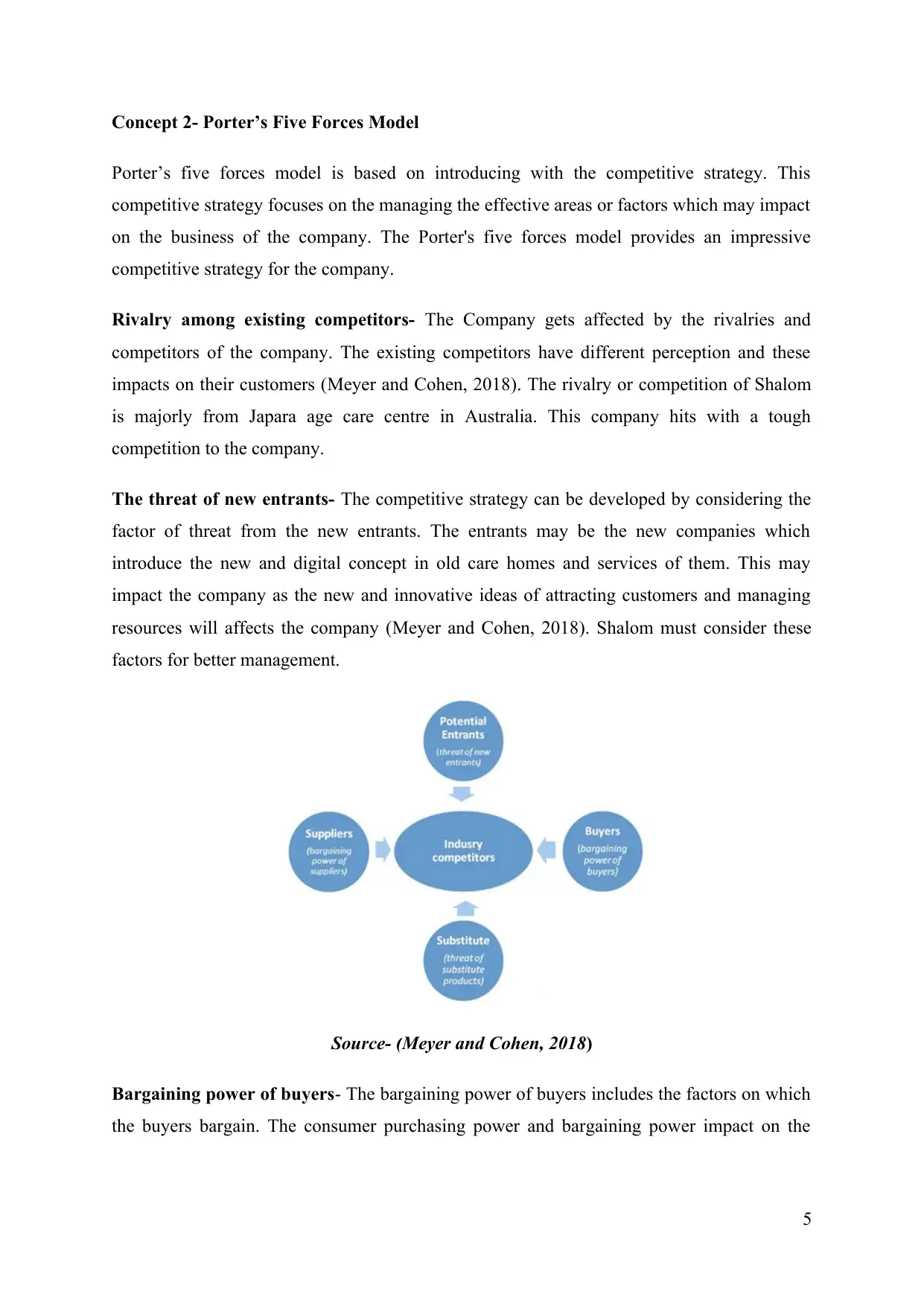
Concept 2- Porter’s Five Forces Model
Porter’s five forces model is based on introducing with the competitive strategy. This
competitive strategy focuses on the managing the effective areas or factors which may impact
on the business of the company. The Porter's five forces model provides an impressive
competitive strategy for the company.
Rivalry among existing competitors- The Company gets affected by the rivalries and
competitors of the company. The existing competitors have different perception and these
impacts on their customers (Meyer and Cohen, 2018). The rivalry or competition of Shalom
is majorly from Japara age care centre in Australia. This company hits with a tough
competition to the company.
The threat of new entrants- The competitive strategy can be developed by considering the
factor of threat from the new entrants. The entrants may be the new companies which
introduce the new and digital concept in old care homes and services of them. This may
impact the company as the new and innovative ideas of attracting customers and managing
resources will affects the company (Meyer and Cohen, 2018). Shalom must consider these
factors for better management.
Source- (Meyer and Cohen, 2018)
Bargaining power of buyers- The bargaining power of buyers includes the factors on which
the buyers bargain. The consumer purchasing power and bargaining power impact on the
5
Porter’s five forces model is based on introducing with the competitive strategy. This
competitive strategy focuses on the managing the effective areas or factors which may impact
on the business of the company. The Porter's five forces model provides an impressive
competitive strategy for the company.
Rivalry among existing competitors- The Company gets affected by the rivalries and
competitors of the company. The existing competitors have different perception and these
impacts on their customers (Meyer and Cohen, 2018). The rivalry or competition of Shalom
is majorly from Japara age care centre in Australia. This company hits with a tough
competition to the company.
The threat of new entrants- The competitive strategy can be developed by considering the
factor of threat from the new entrants. The entrants may be the new companies which
introduce the new and digital concept in old care homes and services of them. This may
impact the company as the new and innovative ideas of attracting customers and managing
resources will affects the company (Meyer and Cohen, 2018). Shalom must consider these
factors for better management.
Source- (Meyer and Cohen, 2018)
Bargaining power of buyers- The bargaining power of buyers includes the factors on which
the buyers bargain. The consumer purchasing power and bargaining power impact on the
5
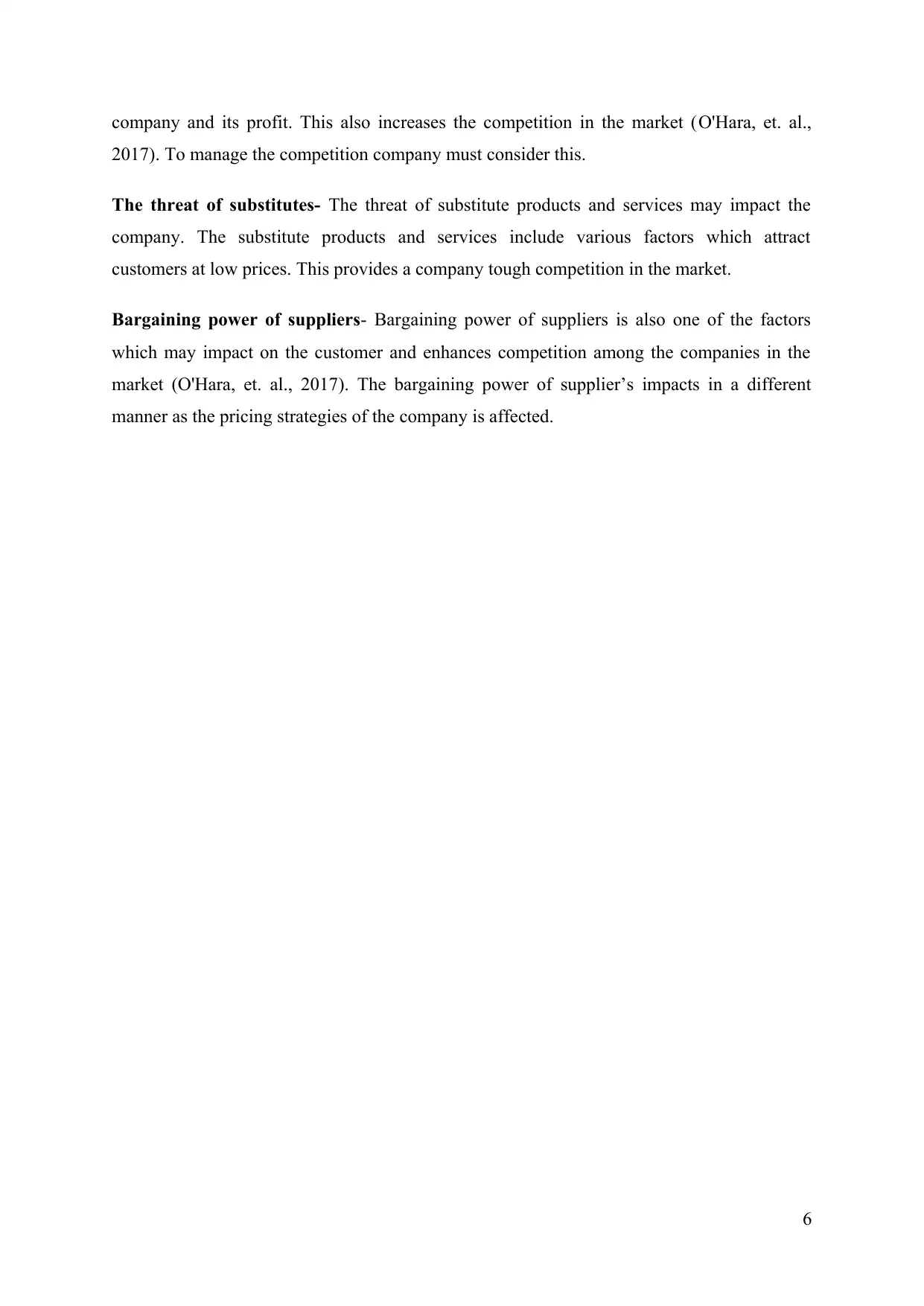
company and its profit. This also increases the competition in the market (O'Hara, et. al.,
2017). To manage the competition company must consider this.
The threat of substitutes- The threat of substitute products and services may impact the
company. The substitute products and services include various factors which attract
customers at low prices. This provides a company tough competition in the market.
Bargaining power of suppliers- Bargaining power of suppliers is also one of the factors
which may impact on the customer and enhances competition among the companies in the
market (O'Hara, et. al., 2017). The bargaining power of supplier’s impacts in a different
manner as the pricing strategies of the company is affected.
6
2017). To manage the competition company must consider this.
The threat of substitutes- The threat of substitute products and services may impact the
company. The substitute products and services include various factors which attract
customers at low prices. This provides a company tough competition in the market.
Bargaining power of suppliers- Bargaining power of suppliers is also one of the factors
which may impact on the customer and enhances competition among the companies in the
market (O'Hara, et. al., 2017). The bargaining power of supplier’s impacts in a different
manner as the pricing strategies of the company is affected.
6
⊘ This is a preview!⊘
Do you want full access?
Subscribe today to unlock all pages.

Trusted by 1+ million students worldwide
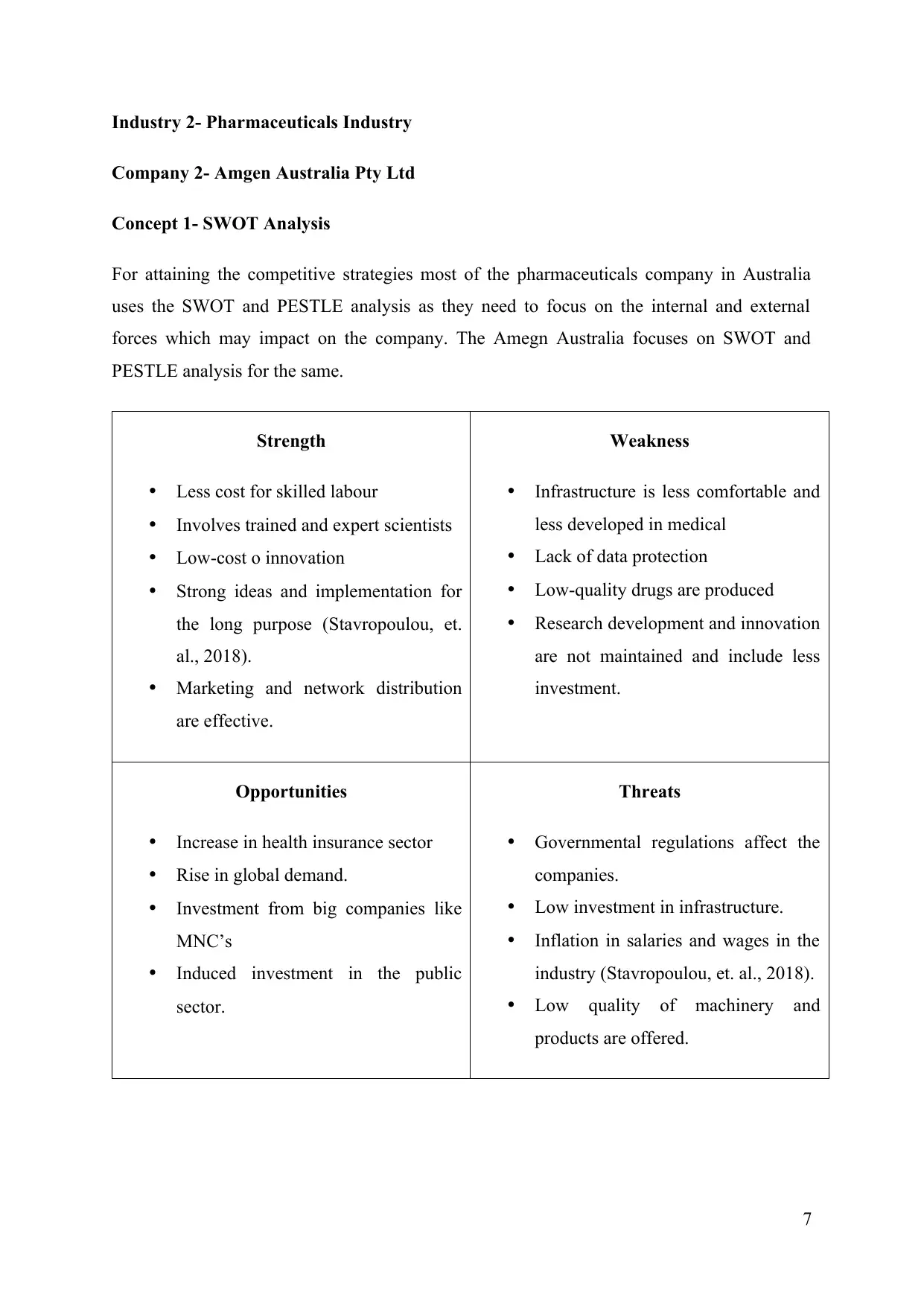
Industry 2- Pharmaceuticals Industry
Company 2- Amgen Australia Pty Ltd
Concept 1- SWOT Analysis
For attaining the competitive strategies most of the pharmaceuticals company in Australia
uses the SWOT and PESTLE analysis as they need to focus on the internal and external
forces which may impact on the company. The Amegn Australia focuses on SWOT and
PESTLE analysis for the same.
Strength
Less cost for skilled labour
Involves trained and expert scientists
Low-cost o innovation
Strong ideas and implementation for
the long purpose (Stavropoulou, et.
al., 2018).
Marketing and network distribution
are effective.
Weakness
Infrastructure is less comfortable and
less developed in medical
Lack of data protection
Low-quality drugs are produced
Research development and innovation
are not maintained and include less
investment.
Opportunities
Increase in health insurance sector
Rise in global demand.
Investment from big companies like
MNC’s
Induced investment in the public
sector.
Threats
Governmental regulations affect the
companies.
Low investment in infrastructure.
Inflation in salaries and wages in the
industry (Stavropoulou, et. al., 2018).
Low quality of machinery and
products are offered.
7
Company 2- Amgen Australia Pty Ltd
Concept 1- SWOT Analysis
For attaining the competitive strategies most of the pharmaceuticals company in Australia
uses the SWOT and PESTLE analysis as they need to focus on the internal and external
forces which may impact on the company. The Amegn Australia focuses on SWOT and
PESTLE analysis for the same.
Strength
Less cost for skilled labour
Involves trained and expert scientists
Low-cost o innovation
Strong ideas and implementation for
the long purpose (Stavropoulou, et.
al., 2018).
Marketing and network distribution
are effective.
Weakness
Infrastructure is less comfortable and
less developed in medical
Lack of data protection
Low-quality drugs are produced
Research development and innovation
are not maintained and include less
investment.
Opportunities
Increase in health insurance sector
Rise in global demand.
Investment from big companies like
MNC’s
Induced investment in the public
sector.
Threats
Governmental regulations affect the
companies.
Low investment in infrastructure.
Inflation in salaries and wages in the
industry (Stavropoulou, et. al., 2018).
Low quality of machinery and
products are offered.
7
Paraphrase This Document
Need a fresh take? Get an instant paraphrase of this document with our AI Paraphraser
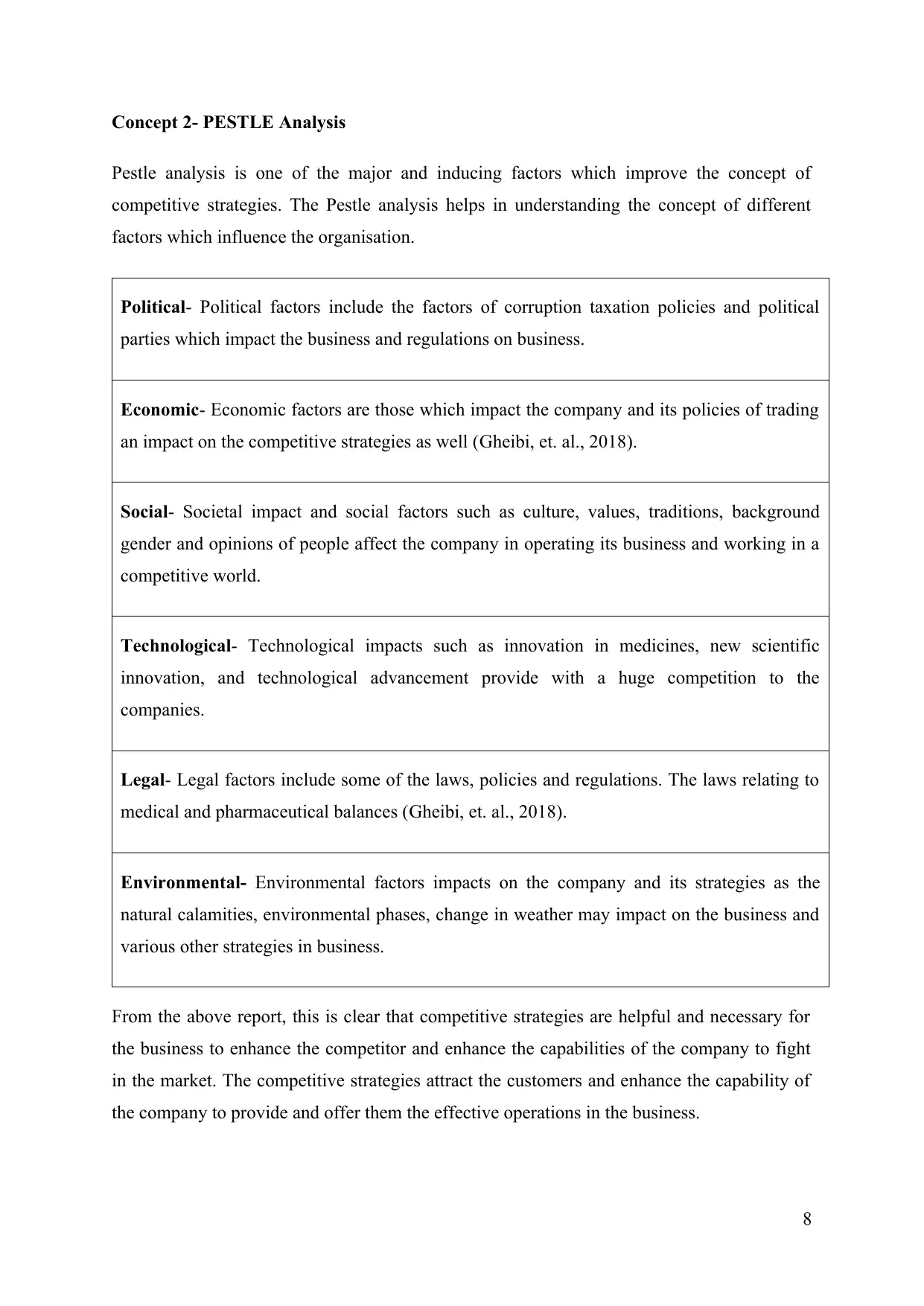
Concept 2- PESTLE Analysis
Pestle analysis is one of the major and inducing factors which improve the concept of
competitive strategies. The Pestle analysis helps in understanding the concept of different
factors which influence the organisation.
Political- Political factors include the factors of corruption taxation policies and political
parties which impact the business and regulations on business.
Economic- Economic factors are those which impact the company and its policies of trading
an impact on the competitive strategies as well (Gheibi, et. al., 2018).
Social- Societal impact and social factors such as culture, values, traditions, background
gender and opinions of people affect the company in operating its business and working in a
competitive world.
Technological- Technological impacts such as innovation in medicines, new scientific
innovation, and technological advancement provide with a huge competition to the
companies.
Legal- Legal factors include some of the laws, policies and regulations. The laws relating to
medical and pharmaceutical balances (Gheibi, et. al., 2018).
Environmental- Environmental factors impacts on the company and its strategies as the
natural calamities, environmental phases, change in weather may impact on the business and
various other strategies in business.
From the above report, this is clear that competitive strategies are helpful and necessary for
the business to enhance the competitor and enhance the capabilities of the company to fight
in the market. The competitive strategies attract the customers and enhance the capability of
the company to provide and offer them the effective operations in the business.
8
Pestle analysis is one of the major and inducing factors which improve the concept of
competitive strategies. The Pestle analysis helps in understanding the concept of different
factors which influence the organisation.
Political- Political factors include the factors of corruption taxation policies and political
parties which impact the business and regulations on business.
Economic- Economic factors are those which impact the company and its policies of trading
an impact on the competitive strategies as well (Gheibi, et. al., 2018).
Social- Societal impact and social factors such as culture, values, traditions, background
gender and opinions of people affect the company in operating its business and working in a
competitive world.
Technological- Technological impacts such as innovation in medicines, new scientific
innovation, and technological advancement provide with a huge competition to the
companies.
Legal- Legal factors include some of the laws, policies and regulations. The laws relating to
medical and pharmaceutical balances (Gheibi, et. al., 2018).
Environmental- Environmental factors impacts on the company and its strategies as the
natural calamities, environmental phases, change in weather may impact on the business and
various other strategies in business.
From the above report, this is clear that competitive strategies are helpful and necessary for
the business to enhance the competitor and enhance the capabilities of the company to fight
in the market. The competitive strategies attract the customers and enhance the capability of
the company to provide and offer them the effective operations in the business.
8
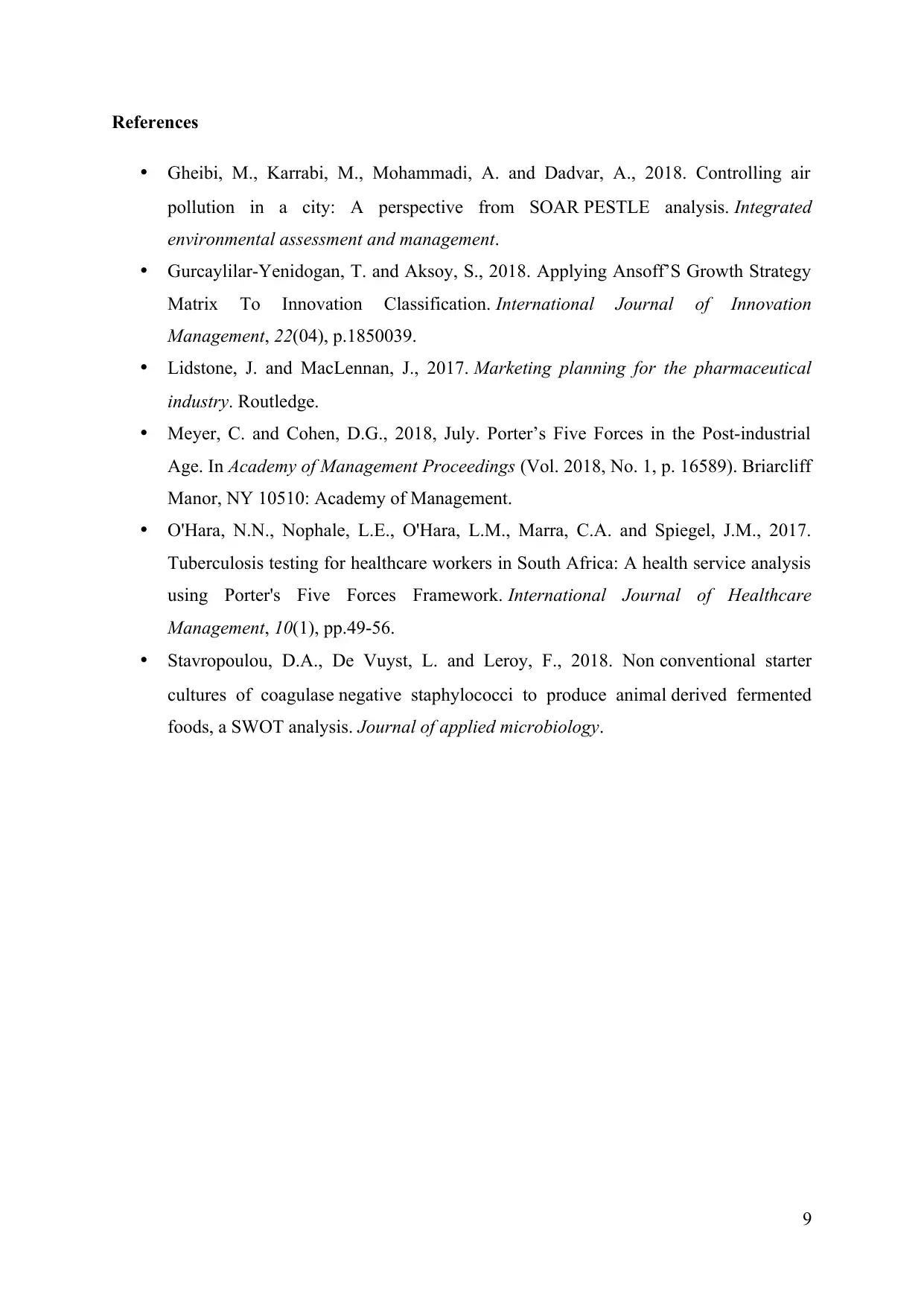
References
Gheibi, M., Karrabi, M., Mohammadi, A. and Dadvar, A., 2018. Controlling air
pollution in a city: A perspective from SOAR‐PESTLE analysis. Integrated
environmental assessment and management.
Gurcaylilar-Yenidogan, T. and Aksoy, S., 2018. Applying Ansoff’S Growth Strategy
Matrix To Innovation Classification. International Journal of Innovation
Management, 22(04), p.1850039.
Lidstone, J. and MacLennan, J., 2017. Marketing planning for the pharmaceutical
industry. Routledge.
Meyer, C. and Cohen, D.G., 2018, July. Porter’s Five Forces in the Post-industrial
Age. In Academy of Management Proceedings (Vol. 2018, No. 1, p. 16589). Briarcliff
Manor, NY 10510: Academy of Management.
O'Hara, N.N., Nophale, L.E., O'Hara, L.M., Marra, C.A. and Spiegel, J.M., 2017.
Tuberculosis testing for healthcare workers in South Africa: A health service analysis
using Porter's Five Forces Framework. International Journal of Healthcare
Management, 10(1), pp.49-56.
Stavropoulou, D.A., De Vuyst, L. and Leroy, F., 2018. Non‐conventional starter
cultures of coagulase‐negative staphylococci to produce animal‐derived fermented
foods, a SWOT analysis. Journal of applied microbiology.
9
Gheibi, M., Karrabi, M., Mohammadi, A. and Dadvar, A., 2018. Controlling air
pollution in a city: A perspective from SOAR‐PESTLE analysis. Integrated
environmental assessment and management.
Gurcaylilar-Yenidogan, T. and Aksoy, S., 2018. Applying Ansoff’S Growth Strategy
Matrix To Innovation Classification. International Journal of Innovation
Management, 22(04), p.1850039.
Lidstone, J. and MacLennan, J., 2017. Marketing planning for the pharmaceutical
industry. Routledge.
Meyer, C. and Cohen, D.G., 2018, July. Porter’s Five Forces in the Post-industrial
Age. In Academy of Management Proceedings (Vol. 2018, No. 1, p. 16589). Briarcliff
Manor, NY 10510: Academy of Management.
O'Hara, N.N., Nophale, L.E., O'Hara, L.M., Marra, C.A. and Spiegel, J.M., 2017.
Tuberculosis testing for healthcare workers in South Africa: A health service analysis
using Porter's Five Forces Framework. International Journal of Healthcare
Management, 10(1), pp.49-56.
Stavropoulou, D.A., De Vuyst, L. and Leroy, F., 2018. Non‐conventional starter
cultures of coagulase‐negative staphylococci to produce animal‐derived fermented
foods, a SWOT analysis. Journal of applied microbiology.
9
⊘ This is a preview!⊘
Do you want full access?
Subscribe today to unlock all pages.

Trusted by 1+ million students worldwide
1 out of 9
Related Documents
Your All-in-One AI-Powered Toolkit for Academic Success.
+13062052269
info@desklib.com
Available 24*7 on WhatsApp / Email
![[object Object]](/_next/static/media/star-bottom.7253800d.svg)
Unlock your academic potential
Copyright © 2020–2026 A2Z Services. All Rights Reserved. Developed and managed by ZUCOL.



